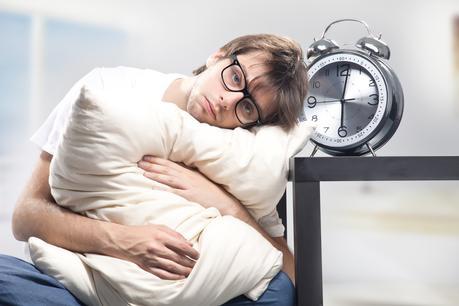
Americans are spending the equivalent of two and a half years of their lifetime tossing, turning and losing sleep, and revealing their top "bed crimes," from hogging the sheets and grinding teeth to using electronics in bed and snoring.
Eighty-nine percent say they suffer from regular nights of disturbed sleep or have trouble falling asleep, with one in three rarely getting a full night's sleep.
In fact, 70 percent of Americans worry that they will never get a full night's sleep again!
Download video: https://www.dropbox.com/s/j165k4uzkbuwlmo/sleepless%20nights.mov?oref=eThe study of 1,000 people by snoring aid specialist Theraventsnoring.com found that stress, anxiety and worrying are the most common reasons why people are suffering from lack of sleep, followed by needing to get up to use the bathroom and being too hot.
Other reasons include health problems, pain and soreness, money worries and snoring partners.
"Disrupted sleep is a constant problem that continues to spiral out of control, making many people feel helpless, frustrated and tired," said Matt Williams, CEO of Theravent, Inc. "We've all heard stories about disrupted sleep caused by snoring and unfortunately too many continue to yield to the noise, when they could enjoy a silent, comfortable night of sleep."
There was the survey respondent who slept in their car, so as not to disturb the guests who were snoring loudly in the living room. Many years ago while living in a dorm, the same respondent slept in a closet, because the room was usually too noisy with partiers.
Another respondent said she woke up to her partner's face inches away from hers. "His eyes were huge and he screamed 'Giant Ants there everywhere!' Then he turned over and started snoring! It was 3 AM and there was no chance of me falling back to sleep."
On average, Americans say they lose 7.3 hours of sleep every week, with 16 percent saying they lose as much as 10-12 hours of sleep each week.
Sunday turns out to be the worst day for falling asleep, as most Americans are worrying about the week ahead.
Lack of sleep is affecting productivity, with one in six saying their productivity level after a night of lost sleep is no more than 25 percent and 27 percent saying it hovers between 26 and 50 percent.
Only 17 percent say their productivity level the next day after losing sleep is between 75-100 percent.
And mood suffers as well. Fifty-eight percent say they are cranky the next day. Thirty percent are depressed or sad. Twenty-eight percent admit to being frazzled and 24 percent say they don't feel good about themselves.
Among the comments they hear that probably don't help are, "You look really tired and exhausted," "You don't look so good," and "What happened to you?"
In fact, 57 percent of those weary-eyed admit they move slowly and get less done. Forty-eight percent struggle to concentrate and 29 percent admit they make more mistakes.
Among the mistakes, 38 percent have overslept the next morning, 34 percent have snapped at a spouse or partner and 22 percent have made mistakes at work.
One in four say they are ok with their spouse or partner sleeping soundly next to them, but 11 percent admit to being jealous and seven percent say they even become angry and resentful.
Among other things, people have snapped at their children, fallen asleep while daydreaming at work and been groggy all day. One fatigued respondent, when asked about the effects of lack of sleep, said he was "too tired to properly answer."
Why We Are Losing Sleep- Stress/anxiety/too much on my mind/worrying about things like money
- Need to get up to use the bathroom
- Being too hot
- Health problems/pain/soreness/something hurts
- Money worries
- Spouse/partner snoring
- Nightmares/bad dreams
- Went to bed late the night before
- Work issues
- Being too cold
- Snoring
- Constant changing sleep positions
- Frequent trips to the bathroom
- Going to sleep at different times
- Watching TV in bed
- Hogging the comforter/bed spread/sheets
- Hogging the bed
- Grinding teeth
- Using/looking at electronics (cell phone, iPod, ipad, laptop, etc.)
- Throwing the sheets off of one side



